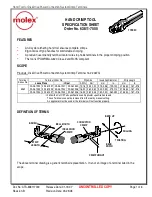
English
17
Controls
1 ............Slider
2 ............Guide bell
3 ............Clamping sleeve
4 ............Forward swinging adjustment lever
5 ............Switch button
6 ............Stroke number controller
7 ............Locking button
8 ............Pull-rod
9 ............Vacuum adaptor
10a ........Protective cover for upright cutting
10b .......Protective cover for angular cutting
11 ..........Pad
12 ..........Pad screw (4x)
13 ..........Guide fixation screw (2x)
14 ..........Hexagonal wrench
15 ..........Circular-saw blade
16 ..........Pad against material fringe
17 ..........Surfaces for fixing a pad against fringe
18 ..........Slider adjusting screw
19 ..........Tilt scale
20 ..........Guide
21 ..........Guide buffer
22 ..........Guide scale
23 ..........Inner edge of the slider
24 ..........Centre plug
25 ..........Centre plug hole
26 ..........Air vents
Depicted or described accessories need not necessarily become the in-
tegral part of the machine delivery.
Double insulation
To ensure maximum safety of the user, our tools are designed and built
to satisfy applicable European standards (EN standards). Tools with
double insulation are marked by the international symbol of a double
square. These tools must not be grounded and a two-wire cable is suffi-
cient to supply them with power. Tools are shielded in accordance with
EN 55014.
Use
The machine is designed for parting cuts and cuts in timber, plastic,
metal and ceramics. It is suitable for straight and curved cuts with bevel
angle from 0°to 45°. Use the circular-saw blades recommended by the
manufacturer.
The user himself is liable for any improper use.
Circular-saw blade clamping (Fig. Ia)
Pull the supply cable out electric outlet socket.
Then tilt the forward swinging lever (4) to vertical position (degree 0).
Remove the protective cover (10) if fitted. Lift the clamping sleeve (3)
fully and hold it. Insert the saw blade (15) into the pull rod hole (8). Once
the saw blade is pushed fully into the pull rod, press the guide bell (2)
and release holding of the clamping sleeve. By pulling the saw blade
downwards make sure it is firmly fixed in the pull rod. Put the protective
guard (10) on.
Removal of circular-saw blade (Fig. Ib)
Pull the supply cable out of the electric outlet socket.
Then tilt the forward swinging lever (4) to vertical position (degree 0).
Remove the protective cover (10) if fitted. Lift the clamping sleeve (3)
fully and hold it. By pulling the circular-saw blade (15) away from the
machine body at simultaneous pulling the circular-saw blade down-
wards take the blade out of the pull rod (8). Release clamping of the
clamping sleeve.
Forward swinging
Forward swinging is derived from the horizontal movement of the
guide bell (2) synchronously with the movement of the pull rod (8) up
and down. In up and down movement the saw blade recedes from the
material. This simplifies removal of chips and reduces heat build-up by
friction. The service life of the saw blade prolongs.
The forward swinging adjustment lever (4) allows adjustment of for-
ward swinging in four degrees. This can be used to adjust the gearing
to various material types when the saw blade moves up. The forward
swinging adjustment is feasible also when the machine is in run:
0
=
Zero forward swinging
I
=
Small forward swinging
II
=
Medium forward swinging
III
=
High forward swinging
Technical Data
Hand jigsaw
Type
EPL 10-5 E
EPL 10-5 BE
Voltage (V)
230
230
Power frequency (Hz)
50–60
50–60
Rated power input (W)
550
550
Number of strokes in idle cycle (rpm)
350–3 200
350–3 200
Electronic stroke number selection
Hoisting (mm)
26
26
Cut-through (mm)
in timber
100
100
in colour metals
20
20
in steel
5
5
Chamfer cuts
-45° – +45°
-45° – +45°
Quick coupling blade system*
Weight (kg)
1.9
2.1
Protection class
II /
II /
*(System of tool-less circular-saw blade clamping)
















































